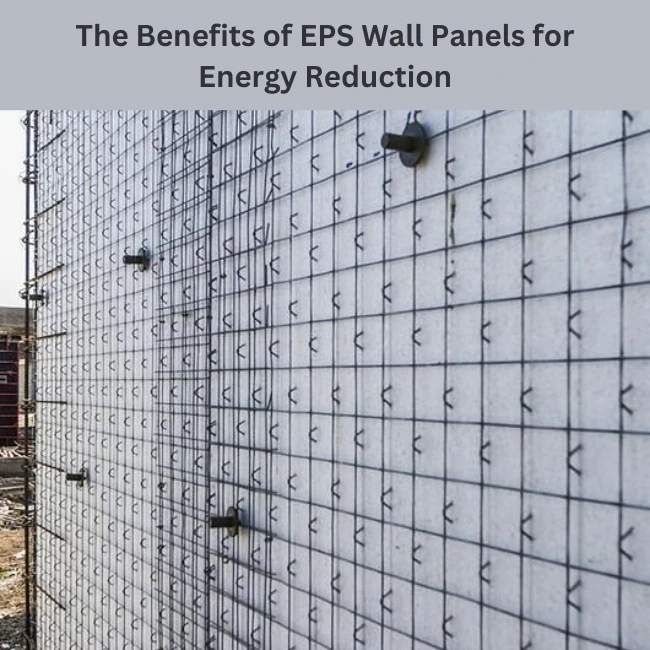In the ever-evolving landscape of sustainable construction practices, the quest for energy-efficient building materials remains paramount. As concerns about environmental impact and energy consumption continue to grow, architects, builders, and homeowners alike are seeking innovative solutions to minimize energy usage while maximizing efficiency. Among the array of options available, EPS (expanded polystyrene) wall panels stand out as a versatile and effective solution for achieving substantial energy reduction in buildings.
EPS wall panels, composed of expanded polystyrene foam sandwiched between two layers of protective material, offer a host of benefits that make them an attractive choice for energy-conscious projects. Let’s delve into some of the key advantages:
Table of Contents
ToggleOutstanding Insulation Properties:
EPS foam boasts exceptional thermal insulation properties, effectively reducing heat transfer between the interior and exterior of a building. This high thermal resistance helps maintain comfortable indoor temperatures year-round, minimizing the need for heating and cooling systems. By significantly reducing thermal bridging, EPS wall panels contribute to lower energy bills and a reduced carbon footprint.
Air Tightness and Moisture Resistance:
The tight cellular structure of EPS foam inhibits the passage of air and moisture, creating a barrier that helps prevent drafts and moisture infiltration. Enhanced air tightness not only improves indoor comfort but also reduces the workload on HVAC systems, further lowering energy consumption. Additionally, EPS panels’ moisture resistance properties make them ideal for humid environments, preventing issues such as mold growth and structural degradation.
Lightweight and Easy Installation:
Compared to traditional building materials, EPS wall panels are remarkably lightweight, facilitating quick and hassle-free installation. Their ease of handling and maneuverability not only accelerates construction timelines but also reduces labor costs. Furthermore, the lightweight nature of EPS panels translates to lower transportation emissions, contributing to overall sustainability.
Versatility in Design and Application:
EPS wall panels offer architects and builders a wide range of design possibilities, allowing for flexibility in both aesthetic and structural aspects. Whether used in residential, commercial, or industrial settings, EPS panels can be customized to meet specific requirements, including varying thicknesses, shapes, and finishes. Their versatility makes them suitable for new construction projects as well as retrofitting existing buildings for improved energy performance.
Durable and Long-lasting:
Despite their lightweight composition, EPS wall panels exhibit remarkable durability and longevity. Resistant to rot, decay, and pests, EPS foam maintains its structural integrity over time, ensuring sustained energy efficiency throughout the lifespan of a building. This durability translates to reduced maintenance costs and a prolonged service life, making EPS panels a cost-effective investment in the long run.
Environmental Sustainability:
EPS wall panels align with sustainable building practices, offering environmental benefits at every stage of their lifecycle. Made from recyclable materials and requiring minimal energy input during manufacturing, EPS foam boasts a low environmental footprint compared to alternative building materials. Additionally, the energy savings achieved through the use of EPS panels contribute to overall carbon emissions reduction, supporting efforts to combat climate change.
In conclusion, EPS wall panels represent a compelling solution for maximizing energy efficiency in buildings. Their superior insulation properties, air tightness, moisture resistance, ease of installation, versatility, durability, and environmental sustainability make them an ideal choice for architects, builders, and homeowners seeking to reduce energy consumption and enhance overall building performance. By incorporating EPS panels into construction projects, we can pave the way for a more sustainable and energy-efficient built environment, benefiting both present and future generations.
Also, read
Benefits Of Insulating Your Home In India A Complete Guide
FAQs
What are EPS wall panels, and how do they contribute to energy reduction?
EPS wall panels are construction materials composed of expanded polystyrene foam sandwiched between protective layers. They contribute to energy reduction by providing exceptional thermal insulation, minimizing heat transfer between the interior and exterior of buildings. This reduces the reliance on heating and cooling systems, leading to lower energy consumption and costs.
How do EPS wall panels compare to traditional building materials in terms of energy efficiency?
Compared to traditional building materials such as concrete or wood, EPS wall panels offer superior thermal insulation properties. Their high thermal resistance minimizes thermal bridging and air infiltration, resulting in reduced energy usage for heating and cooling. This makes them a more energy-efficient choice for constructing both new buildings and retrofitting existing structures.
Can EPS wall panels help improve indoor comfort levels?
Yes, EPS wall panels can significantly improve indoor comfort levels by maintaining more stable temperatures throughout the year. Their EPS Panels insulation properties help prevent heat loss in winter and heat gain in summer, creating a more comfortable living or working environment. Additionally, their air tightness reduces drafts, enhancing overall comfort.
Are EPS wall panels suitable for all types of buildings?
EPS wall panels are highly versatile and can be used in various types of buildings, including residential, commercial, and industrial structures. They can be customized to meet specific design and structural requirements, making them suitable for both new construction projects and retrofitting existing buildings for energy efficiency improvements.
Are EPS wall panels environmentally friendly?
Yes, EPS wall panels are considered environmentally friendly for several reasons. They are made from recyclable materials and require minimal energy input during manufacturing compared to some other building materials. Additionally, their energy-saving properties contribute to reduced carbon emissions, supporting sustainability efforts in the construction industry.
What are the maintenance requirements for EPS wall panels?
EPS wall panels are low maintenance compared to many other building materials. Their durable composition resists rot, decay, and pests, reducing the need for frequent repairs or replacements. Regular cleaning to remove dirt and debris is typically sufficient to maintain their appearance and performance over time.
How do I choose the right EPS wall panels for my project?
When selecting EPS wall panels for a project, consider factors such as desired insulation levels, structural requirements, aesthetic preferences, and budget constraints. Work with experienced architects, builders, or suppliers who can provide guidance on choosing the most suitable EPS panels for your specific needs and goals.
Watch Video



